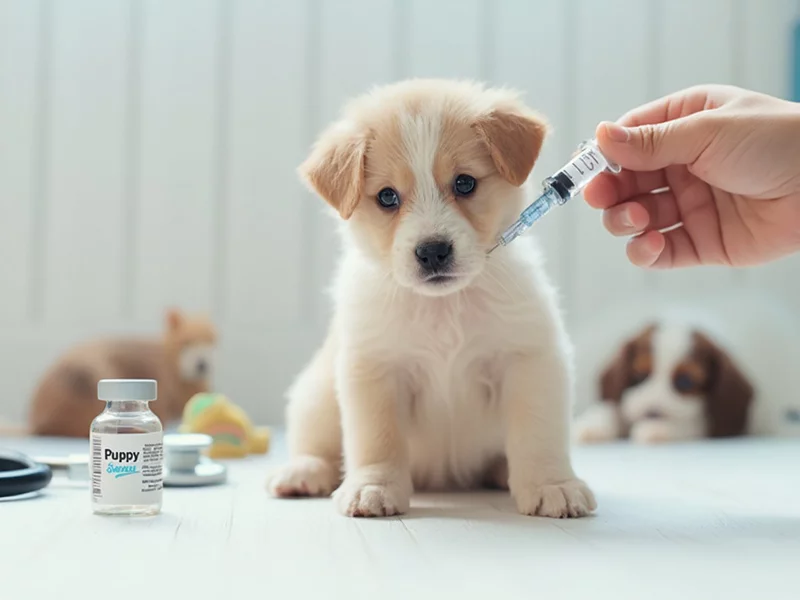First Vaccination
Typically administered:
6-8 Weeks of Age
- ✓ C3 or C5 (Vet's Advice)
- ✓ Core Vaccines (Parvovirus, Distemper)
As a devoted pet owner, navigating the complexities of your puppy's health can feel overwhelming. Yet, understanding the vaccination schedule is vital for ensuring your furry friend grows up healthy and happy. Follow these key insights to boost your knowledge and confidence in puppy care!
Ensuring your puppy's health in Sydney involves understanding and adhering to a crucial vaccination timeline. Below are the typical stages and types of vaccinations required.
Typically administered:
6-8 Weeks of Age
Scheduled around:
10-12 Weeks of Age
Key for lifelong health:
Regular Vet Visits
Mandatory for pet owners:
Stay Updated
As a pet owner, ensuring your puppy's health is a top priority, and understanding the puppy vaccination schedule is a crucial part of that. Vaccinations not only protect your puppy from serious diseases but also play a vital role in public health. It’s essential to stay informed about the vaccination timeline so your furry friend can grow into a healthy and happy adult.
In Sydney, the vaccination schedule is designed to provide puppies with the necessary immunity at various stages of their early lives. Each vaccination is timed to maximize its effectiveness against diseases. By adhering to this schedule, you can help keep your puppy safe from common and potentially fatal illnesses.
Vaccinations are your puppy's first line of defense against numerous infectious diseases. When your puppy receives vaccines, it triggers their immune system to produce antibodies, which help fight off illnesses. Without these vaccines, your puppy is at a higher risk of contracting diseases such as parvovirus, distemper, and hepatitis, which can be deadly. For more information on the importance of pet vaccinations, you can consult RSPCA's latest blog on pet vaccinations.
Additionally, vaccinating your puppy is often a requirement for registration and participation in dog parks or training classes. It’s a win-win situation—keeping your puppy healthy and allowing them to engage with other dogs.
In New South Wales, there are specific regulations that govern puppy vaccinations. These rules ensure that pets receive appropriate vaccinations at the right ages. The Australian Veterinary Association (AVA) provides comprehensive policies on the vaccination of dogs and cats, which are a valuable resource for pet owners. Best Vets Sydney highly recommends staying updated with these regulations to ensure compliance and your puppy's health.
Being aware of these regulations not only helps in legal compliance but also guides you in making informed decisions regarding your puppy's healthcare. Always consult your veterinarian for the most accurate and current information regarding puppy vaccinations in your area.
To ensure your puppy receives the best protection, always keep a detailed vaccination record. This not only helps you track upcoming appointments but also provides important information for your vet during consultations. Consider using a smartphone app or a dedicated notebook to maintain this record easily!
Puppies typically receive their first vaccination between 6 to 8 weeks of age. This initial shot is crucial for building early immunity against common diseases.
Core vaccines are essential vaccinations that protect against highly contagious and potentially fatal diseases such as parvovirus, distemper, and hepatitis. Yes, these are generally considered mandatory for all puppies.
After their first vaccination, puppies usually require follow-up and booster shots around 10-12 weeks of age to complete their initial immunity series. Your vet will provide a specific schedule tailored to your puppy.
Regular vet health checks are important for monitoring your puppy's overall growth and development, catching early signs of health issues, and addressing any concerns you may have about diet, exercise, or behavior. Vaccinations are just one part of comprehensive care.
You can find information about NSW regulations for puppy vaccinations through the Australian Veterinary Association (AVA) and specific fact sheets like the NSW Puppy Vaccination Fact Sheet. Your local veterinarian is also an excellent resource for accurate and current information.
Building a strong relationship with your vet is essential for your puppy’s health and well-being. This partnership goes far beyond just vaccinations; it encompasses regular health checks, ongoing communication, and a shared commitment to your puppy's care. As a passionate advocate for animal health, I believe that frequent vet visits can significantly enhance not only your puppy's life but also your experience as a pet owner!
It's important to understand that vaccination is just one part of your puppy's healthcare journey. Regular health checks should be scheduled to monitor your pet's growth and development. These visits allow your vet to:
By staying proactive, you can ensure a healthier, happier life for your puppy, fostering a bond built on trust and understanding.
To help manage your puppy's vaccinations and overall health care, I recommend creating a vaccination checklist. This will not only keep you organized but also make sure you never miss an important appointment! Here are some key items to include:
Having this checklist handy will help both you and your vet stay aligned on your puppy's healthcare needs.
Your vet will have specific recommendations tailored to your puppy's unique needs. Here are some common suggestions you might expect:
By following your vet's recommendations, you set your puppy up for a lifetime of health and happiness. Don’t hesitate to ask questions or seek clarification on any of their advice—after all, your vet is there to help!
Here is a quick recap of the important points discussed in the article:

 Understanding the Importance of Puppy Care
As a new puppy parent, ensuring your furry friend receiv
Understanding the Importance of Puppy Care
As a new puppy parent, ensuring your furry friend receiv
 As pet owners, understanding the financial implications of emergency vet visits is crucial for ensur
As pet owners, understanding the financial implications of emergency vet visits is crucial for ensur
 The journey towards a healthier pet can start with a simple question: Are you ready to consider a ho
The journey towards a healthier pet can start with a simple question: Are you ready to consider a ho
 ##
Have you ever considered the significant impact that vaccinations have not just on your dog, but
##
Have you ever considered the significant impact that vaccinations have not just on your dog, but